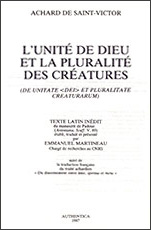
Scholarly Works


De unitate Dei et pluralitate creaturarum
(De l'Unité de Dieu et De la pluralité des créatures)
ISBN: 906928-00-3
Achard de Saint-Victor, perfect bound, éd. E. Martineau, brochée, Paris, Editions du Franc-Dire, Authentica, 1987, 17 x 24 cm, pp. 297. €.48,00.
A critical edition of the unpublished Padua manuscript attributed to Achard de Saint-Victor, translated from Latin into French and edited by Emmanuel Martineau (C.N.R.S.). Followed by a French translation of another treatise by the same author entitled De discretione animæ, Spiritus et mentis (Du Discernement en l'âme, l'esprit et l'intellect).
The treatise of the theologian and metaphysician of the Twelfth Century, Achard de Saint-Victor, is now available for the first time in its entirety. The Martineau edition of the De unitate Dei, with its bilingual (Latin/French) presentation, compellingly elucidates one of the major philosophical tracts of the Middle Ages and offers a new challenge to the traditional understanding of mediaeval philosophy. The scholarly edition is enhanced by an elaborate critical apparatus pertaining to the philosophy and structure of the De unitate Dei : an introduction elucidating the various sources of the text and its fortunes (pp. 7-68), several explanatory appendices (Éclaircissements, pp. 209-50), tables and index (pp. 261-96), including detailed philological and philosophical references. A work of considerable importance which is an absolute must for any scholarly library.
Texte latin inédit du manuscrit de Padoue attribué à Achard de Saint-Victor, établi, présenté, indexé et traduit en français par Emmanuel Martineau, C.N.R.S., suivi de la traduction en français d'un autre traité du même auteur. Voici enfin réunies deux œuvres majeures d'Achard de Saint-Victor, théologien et métaphysicien du XIIe siècle. La présente édition de L'Unité de Dieu offre une mise en page bilingue latin/français, et restitue à l'un des grands textes philosophiques du Moyen âge une audace, une complexité et une puissance spéculative qui ont influencé l'interprétation de la philosophie médiévale. Cette édition savante d'un texte inédit comprend un appareil critique des plus élaborés : une introduction sur les sources, la pensée, la structure et les influences (pp. 7-68) ; de précieux éclaircissements (pp. 209-50) ; tables et index (pp. 261-96), et d'indispensables notes philologiques et philosophiques. Un texte fondamental qui se doit de figurer dans toute bibliothèque humaniste.
<< back
(De l'Unité de Dieu et De la pluralité des créatures)
ISBN: 906928-00-3
Achard de Saint-Victor, perfect bound, éd. E. Martineau, brochée, Paris, Editions du Franc-Dire, Authentica, 1987, 17 x 24 cm, pp. 297. €.48,00.
A critical edition of the unpublished Padua manuscript attributed to Achard de Saint-Victor, translated from Latin into French and edited by Emmanuel Martineau (C.N.R.S.). Followed by a French translation of another treatise by the same author entitled De discretione animæ, Spiritus et mentis (Du Discernement en l'âme, l'esprit et l'intellect).
The treatise of the theologian and metaphysician of the Twelfth Century, Achard de Saint-Victor, is now available for the first time in its entirety. The Martineau edition of the De unitate Dei, with its bilingual (Latin/French) presentation, compellingly elucidates one of the major philosophical tracts of the Middle Ages and offers a new challenge to the traditional understanding of mediaeval philosophy. The scholarly edition is enhanced by an elaborate critical apparatus pertaining to the philosophy and structure of the De unitate Dei : an introduction elucidating the various sources of the text and its fortunes (pp. 7-68), several explanatory appendices (Éclaircissements, pp. 209-50), tables and index (pp. 261-96), including detailed philological and philosophical references. A work of considerable importance which is an absolute must for any scholarly library.
Texte latin inédit du manuscrit de Padoue attribué à Achard de Saint-Victor, établi, présenté, indexé et traduit en français par Emmanuel Martineau, C.N.R.S., suivi de la traduction en français d'un autre traité du même auteur. Voici enfin réunies deux œuvres majeures d'Achard de Saint-Victor, théologien et métaphysicien du XIIe siècle. La présente édition de L'Unité de Dieu offre une mise en page bilingue latin/français, et restitue à l'un des grands textes philosophiques du Moyen âge une audace, une complexité et une puissance spéculative qui ont influencé l'interprétation de la philosophie médiévale. Cette édition savante d'un texte inédit comprend un appareil critique des plus élaborés : une introduction sur les sources, la pensée, la structure et les influences (pp. 7-68) ; de précieux éclaircissements (pp. 209-50) ; tables et index (pp. 261-96), et d'indispensables notes philologiques et philosophiques. Un texte fondamental qui se doit de figurer dans toute bibliothèque humaniste.
<< back







